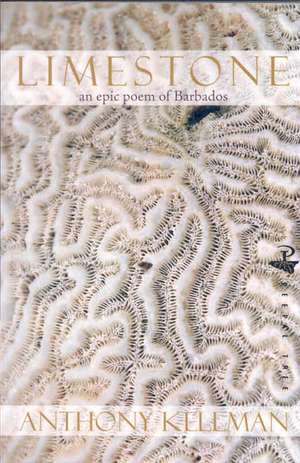Limestone: An Epic Poem of Barbados
Autor Anthony Kellmanen Limba Engleză Paperback – 30 apr 2008
The island of Barbados is the central character is this epic poem, which combines narrative development, historical insight, and traditional folk sounds to tell the story of the island from the time of early Amerindians to the present day. Anthony Kellman invents his own Tuk verse forms that include the three-line tercet verse form, rhymed couplets in tetrameter, and rhythmic patterns of the snare drum. These provide a cadence to each section of the poem, whose sound is organic to the people and cultures being described. Legendary figures including indigenous leader Samuel Jackman Prescod and invented characters provide windows into the polarizing and uniting issues in the nation's history and illustrate the suffering and achievement of Barbados's known and unknown heroes.
Preț: 73.42 lei
Nou
Puncte Express: 110
Preț estimativ în valută:
14.05€ • 14.39$ • 11.69£
14.05€ • 14.39$ • 11.69£
Carte indisponibilă temporar
Doresc să fiu notificat când acest titlu va fi disponibil:
Se trimite...
Preluare comenzi: 021 569.72.76
Specificații
ISBN-13: 9781845230036
ISBN-10: 1845230035
Pagini: 208
Dimensiuni: 135 x 203 x 18 mm
Greutate: 0.25 kg
Editura: Peepal Tree Press
ISBN-10: 1845230035
Pagini: 208
Dimensiuni: 135 x 203 x 18 mm
Greutate: 0.25 kg
Editura: Peepal Tree Press
Notă biografică
Anthony Kellman was born in Barbados in 1955, educated at Combermere School, at UWI (Cave Hill) and in the U.S. At eighteen he left for Britain where he worked as a troubadour playing pop and West Indian folk music on the pub and folk club circuit. He recalls that this was 'glamorous and a great deal of fun', but when the 'harsh realities' of living as a full-time musician set in, he enrolled in a journalism training programme. During the 1980s he returned to Barbados where he worked as a newspaper reporter, then worked part-time to pay his way through UWI (Cave Hill) where he did a BA in English and History. Afterwards he worked in PR for the Central Bank of Barbados, experiences which he drew on in writing 'The Coral Rooms'. As part of this job he was involved in organising art exhibitions and readings.
